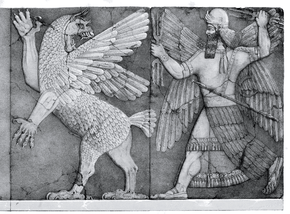Gallu
In Sumerian and ancient Mesopotamian religion, gallûs[1] (also called gallas[2]; Akkadian gallû < Sumerian gal.lu) were great demons or devils of the ancient Mesopotamian Underworld.

A depiction taken from an ancient Sumerian language cylinder seal showing the god Dumuzid being tortured in the Underworld by gallas
| Part of a series on |
| Ancient Mesopotamian religion |
|---|
 Chaos Monster and Sun God |
|
Seven gods who decree
|
|
Other major deities |
|
Demigods and heroes
|
| Related topics |
Role in mythology
Gallu demons hauled unfortunate victims off to the underworld. They were one of seven devils (or "the offspring of hell") of Babylonian theology that could be appeased by the sacrifice of a lamb at their altars.[3]
The goddess Inanna was pursued by gallu demons after being escorted from the Underworld by Galatura and Kuryara.[4][3] An especially fierce gallu demon, the monstrous Asag, was slain by Ninurta using the enchanted mace Sharur.
Other uses
The word gallu may also refer to a human adversary, one that is dangerous and implacable.[5]
gollark: How? Why couldn't they just use the regular internet and save everyone a lot of time?
gollark: `application/prayer` is not a valid MIME type and the format of the body doesn't look like anything I recognize.
gollark: It's not reachable and it doesn't obey the standards.
gollark: Wait, do I need to sacrifice RAMs or something to "God" to make it work?
gollark: Do all the monotheistic gods have annoying APIs like this?
See also
| Look up gallu in Wiktionary, the free dictionary. |
References
- Morris, John (1880). The new nation. Original from Oxford University. pp. 40& 311 (volume 3 of 5).
Gallu demon.
- Muss-Arnolt, William (1905). A Concise Dictionary of the Assyrian Language. Original from Harvard University: Reuther & Reichard; Lemcke & Büchner; etc., etc. p. 216.
- Charles Augustus Briggs, Crawford Howell Toy (1911). Essays in Modern Theology and Related Subjects. Original from Harvard University: C. Scribner's sons. pp. 155–158.
Gallu demon.
CS1 maint: uses authors parameter (link) - Black, Jeremy; Cunningham, Graham; Flückiger-Hawker, Esther; Robson, Eleanor; Taylor, John; Zólyomi, Gábor. "Inana's descent to the netherworld". Electronic Text Corpus of Sumerian Literature. Oxford University. Retrieved 22 June 2017.
- I. Tzvi Abusch Babylonian Witchcraft Literature: Case Studies 1987 "...especially, the initial position which he occupies in both support the propriety of our earlier analysis of obv. 37-40 on the basis of the comparison "Contra AHw sv, gallu in this line refers not to a demon but to a human enemy..."
This article is issued from Wikipedia. The text is licensed under Creative Commons - Attribution - Sharealike. Additional terms may apply for the media files.
_-_EnKi_(Sumerian).jpg)